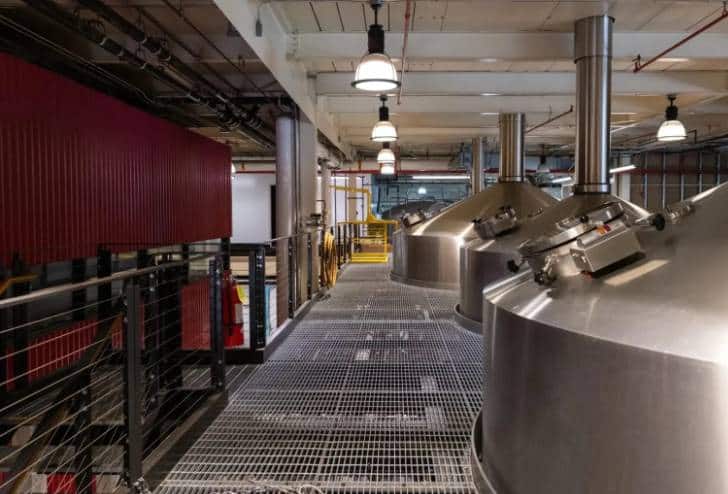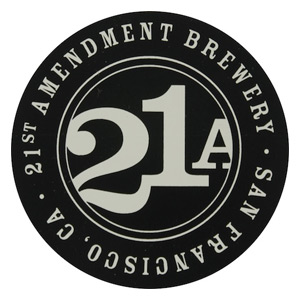
(Courtesy 21st Amendment Brewery)
What does 21st Amendment’s recent announcement say about the current state of the craft beer biz?
It’s not good.
In 2000, Nico Freccia and Shaun O’Sullivan opened the doors to the 21st Amendment brewpub in San Francisco’s historic South Park neighborhood with Freccia managing the restaurant and O’Sullivan spearheading the brewing process and it became an almost overnight success.
In 2015, they opened a 120,000 production brewery and taproom in San Leandro, with an enormous 300,000 BBLs (barrels) brewing capacity as well as state-of-the-art canning and packaging facility.
On March 6 21st Amendment announced that it was making its Bay-area operation available to other beverage producers on a contract basis.
This from 21st Amendment’s press release….
 “When we first began packaging our beer almost 15 years ago, we employed a co-pack facility to help us scale and grow,” says Nico Freccia, Co-Founder and COO.
“When we first began packaging our beer almost 15 years ago, we employed a co-pack facility to help us scale and grow,” says Nico Freccia, Co-Founder and COO.
“We have worked with several of the biggest and most experienced co-pack facilities across the country and so we feel like we know a thing or two about co-packing. And now we’re excited to be able to invite new partners to our San Leandro facility.”
“The facility is centered around its high speed (530 cpm) canning line currently running 12, 16 and 19.2 oz. cans and capable of packaging more than six million cases annually.”
“21st Amendment now has capabilities to make malt or sugar-based alcohol and cider, a Distilled Spirits Permit to make Ready-to-Drink cocktails (RTD’s) and the infrastructure and equipment to produce and package a wide variety of alcohol and non-alcoholic beverages, from beer and N/A beer to FMBs, seltzers, energy drinks, juices, sodas and more.”
So what’s really behind this announcement?
Well the first thing that comes to mind is that 21st Amendment, the 42nd largest craft brewery in the nation which distributes its beers throughout 36 states, has brewing and packaging capability much larger than the current demand for its beers.
When the brewery built its new brewery across the bay from its original home in San Francisco, craft beer was experiencing torrid growth, its potential seemed unlimited and that is no longer the case today.
In 2015 craft beer volume surged by 13% with an increase of 16% in retail sale according to the Brewers Association. So you can understand 21st Amendment’s thinking. Two years later that growth had slowed to 5%.
And with more than 9,500 craft breweries now operating across the US and an industry maturing with many consumers transitioning from beer to new products like Ready-to-Drink cocktails, demand for 21st Amendment’s products has slowed.
As Brewbound reports…
“After first crossing the 100,000-barrel mark in 2015 and peaking at 112,854 barrels in 2018, the company’s output declined three straight years (-10% in 2019, -21% in 2020, and -21% in 2021).”
Add in the economic impact of the pandemic on the craft beer industry, and consumer migration away from semi-national, widely-distributed craft beer brands like 21st Amendment to much smaller uber-local breweries that are closer to home, and you can better understand the uncomfortable subtext to the to the San Leonardo-based brewery’s latest announcement.
###
 American Craft Beer The Best Craft Beer, Breweries, Bars, Brewpubs, Beer Stores, And Restaurants Serving Serious Beer.
American Craft Beer The Best Craft Beer, Breweries, Bars, Brewpubs, Beer Stores, And Restaurants Serving Serious Beer.
